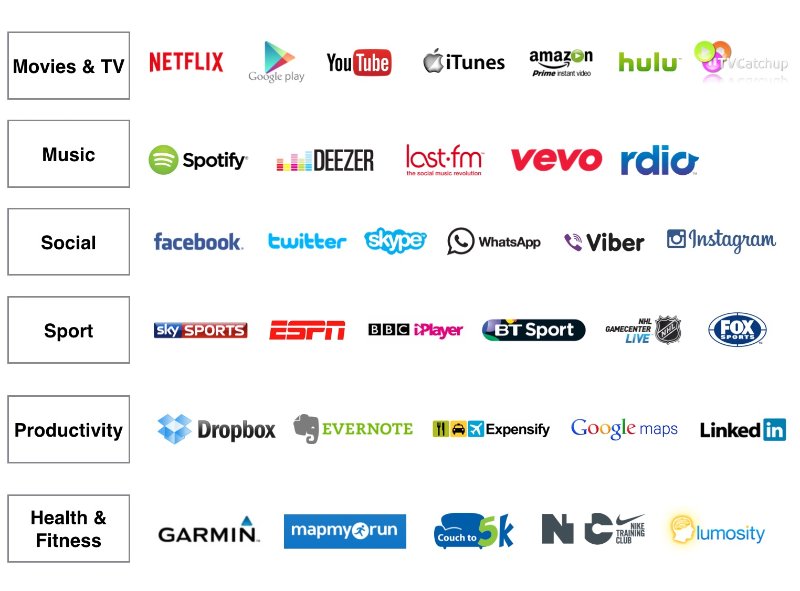Background
This study reviews the impact that Over The Top Services (OTTs) such as Skype, WhatsApp or YouTube have on the traditional telecommunication services. It also explores the question of whether OTTs should be regulated or not; and if so, in what way.
This comes within the backdrop of developing countries (ATU 2016)[1] who argued that OTT service providers take advantage of the prevailing regulatory imbalance that allows them to offer services that are equivalent to regulated services – without necessarily being subjected to the stringent regulatory obligations.
[1] African Telecommunication Union (2016) Draft Resolution, https://www.itu.int/dms_pub/itu-t/md/13/wtsa.16/c/T13-WTSA.16-C-0042!A14!MSW-E.docx
Policy Relevance
With the rapid changes experienced in the telecommunications and internet space where new and old services have converged, the traditional Teclo providers find themselves with reducing revenues, particularly in voice, sms and video segment where their new rivals, the OTT service providers continue to enjoy increasing revenues.
With the argument that the new players are enjoying unfair advantage given that they do not face the same regulatory burdens imposed on the traditional Telco providers, the principle of fair competition or level playing field has often been brought into question.
Some traditional telco providers have been known to block, throttle or prioritize some of the OTT traffic as a reaction to the ever-increasing bandwidth burden placed on their networks by OTT providers. Such interventions are in essence in breach of the principle of Network Neutrality where all transmitted data is expected to be treated equally – irrespective of its source, type or destination.
The regulatory landscape is further complicated by the fact that OTT providers are global players but with local impact. This impact goes beyond competition and includes aspects that touch on content, data protection, privacy and security issues of the local citizens.
Summary of Findings
Regulating OTTs may require different approaches but in most jurisdictions seems to follow the basic principle of light regulation – where competitive market forces are given the first priority to resolve outstanding issues. This means that regulatory intervention is exercised only when consumers have little or no choices (monopoly environments) or where choice exists but switching costs are too high for the consumers.
There are however three key observations to be made arising from the tensions that OTTs bring to bear on traditional the telecommunication services:
- Economic: Evidence shows that Telco operators are experiencing reducing volumes[2] in their traditional segments of voice, sms and broadcast communications. This may potentially hamper their capacity to fund expansion of their broadband communication networks in line with national broadband strategic goals. [2] ITU (2017), Economic Impact of OTTs, https://www.itu.int/dms_pub/itu-t/opb/tut/T-TUT-ECOPO-2017-PDF-E.pdf
- Regulatory Imbalance: It is true that OTT Service providers are not subjected to stringent regulatory requirements that include license and spectrum fees, Quality of Service requirements, Data protection and Security, Taxation amongst others. These gives OTT Service providers undue advantage over the traditional operators in the specific areas of competition.
- OTTs are beneficial: Despite the above two realities, it is also observed that OTTs like Whatsapp, Skype, YouTube have contributed immensely in getting the majority of citizens online –at minimal costs. This has lead to social benefits including but not limited to cheaper communications, increased freedoms of expression and association as well as more completion and choice for the consumers.
Recommendations
Economic Recommendations
With regard to dwindling revenues arising from consumers opting for free services offered by OTTs, it should be noted that Telco providers are also experiencing increased volumes in Data or internet services.
Many Telco’s have rightly re-engineered their business models from being purely transport or bandwidth service providers to being fully integrated ICT solution providers offering a range of products including those offered by OTTs (such as VoIP, IPTV, Cloud, Fintech, etc).
This should be the way forward for Telco’s, rather than having to block OTTs and violating the widely accepted Net Neutrality principles.
There could be a case for providing incentives to the OTTs so that they have local or regional presence for purposes of Taxation and /or participating more deeply in domestic causes. This would be a far better approach as compared to introducing Social media tax[3], which ends up suppressing general internet use and uptake. Copy-pasting tax regimes from developed nations could actually be counterproductive to the country given the local domestic context. [3] Impact of Social Media Tax in Uganda, https://cipesa.org/2019/01/%EF%BB%BFsocial-media-tax-cuts-ugandan-internet-users-by-five-million-penetration-down-from-47-to-35/
Regulatory Imbalance Recommendation:
With respect to the problem of regulatory imbalances, it would be difficult, perhaps inappropriate to try and contain OTT providers within the traditional regulatory instruments used to manage the traditional Telco providers.
This is because they do not have in-country physical infrastructure or corporate presence that often make it easier for regulatory engagement.
In any case, Data Protection and Privacy regulations would provide a better fit for OTTs – given that they are largely content and application service oriented. Enactment and implementation of Data Protection & Privacy Acts would provide a better regulatory framework for OTTs.
Additionally, since OTTs play across multiple jurisdictions that go beyond the narrow scope of telecommunications, it would be imperative to consider joint and coordinated approach for effective regulation.
Several regulatory agencies including but not limited to ICT regulators, Competition regulators, Data Protection regulators, Fintech regulators, Copyright Regulators will therefore need to harmonize their approaches in light of the multisided nature of OTT service providers.
The Research
I Introduction
The research study reviewed literature on the impact OTTs have had on communication offerings provided by the traditional telco providers, namely, voice, text and broadcast services.
II METHOD
Extensive literature review was done to map out the global and local issues of concern arising from the realities of OTTs in the telecommunication sectors. The review focused on establishing how these concerns are dealt with globally and locally based on select thematic areas that included regulatory, economic, competition, network neutrality and data privacy perspectives. Conclusions were then derived based on the observed best practices in terms of regulating Over the Top Services.
III SELECTED Sources/references (includes main REPORT References)
- African Telecommunication Union (2016) Draft Resolution, retrieved from https://www.itu.int/dms_pub/itu-t/md/13/wtsa.16/c/T13-WTSA.16-C-0042!A14!MSW-E.docx
- Commonwealth Telecommunications Organization, Understanding the Dynamics of OTTs (2018), retrieved from https://cto.int/wp-content/uploads/2018/10/MARTIN-KOYABE.pdf
- EU (2016) Open Internet/Net Neutrality Policy, retrieved from https://ec.europa.eu/digital-single-market/en/policies/open-internet-net-neutrality
- Futter, A., & KorAntenG, K. (2016). MUCH ADO ABOUT NOTHING? Retrieved from http://www.researchictafrica.net/publications/Other_publications/2016_RIA_Zero-Rating_Policy_Paper_-_Much_ado_about_nothing.pdf
- ITU (2017), Economic Impact of OTTs, https://www.itu.int/dms_pub/itu-t/opb/tut/T-TUT-ECOPO-2017-PDF-E.pdf
- ICT Regulation Toolkit, GSR 2012, Net Neutrality retrieved from http://www.ictregulationtoolkit.org/document?document_id=4029
- OFCOM (2010), Net Neutrality Consultation Document, retrieved from https://www.ofcom.org.uk/__data/assets/pdf_file/0026/55556/netneutrality.pdf
- ICT Regulation Toolkit , Regulating Over-the-Top services, retrieved from http://www.ictregulationtoolkit.org/toolkit/2.5
- Telecommunication Regulatory Authority of India, Consultative Paper “Regulatory Framework for Over-the-top (OTT) services”, retrieved from https://main.trai.gov.in/sites/default/files/OTT-CP-27032015.pdf
Research by
Walubengo, K. Kariuki, Information Technology | KICTAnet Associates/Multimedia University of Kenya | Magadi Road , Nairobi, KENYA 254-724257083 Fax | jwalubengo@mmu.ac.ke or kkariuki@mmu.a.cke




